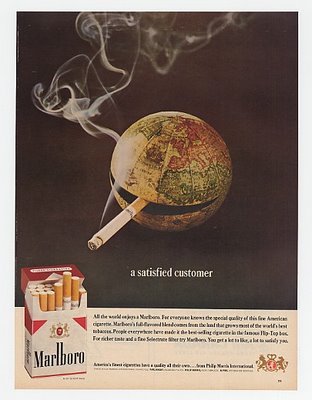Submitted by Anne Landman on
 The approach the world has taken to tobacco control holds many lessons for the COP-15 Climate Change Conference in Copenhagen. A newly-published article in The Lancet (available with free registration) summarizes the many similarities between tobacco control and climate policy, and how the lessons learned from tobacco control can be applied to the way countries approach climate policy.
The approach the world has taken to tobacco control holds many lessons for the COP-15 Climate Change Conference in Copenhagen. A newly-published article in The Lancet (available with free registration) summarizes the many similarities between tobacco control and climate policy, and how the lessons learned from tobacco control can be applied to the way countries approach climate policy.
Deja Vu All Over Again
For both issues, the scientific evidence mounted gradually over the years. Both tobacco and climate change negatively impact public health and disproportionately affect poorer countries and lower socioeconomic groups. Both have long lead times between cause and effect, and the solutions for both require significant political will, comprehensive international policies, and long-term monitoring.
Climate change is similar to the issue of secondhand smoke in the sense that the damage both cause constitute "externalities." That's the word economists use to describe the side effects of a commercial enterprise that negatively impact other parties, where the cost is not reflected in the price of the product. Markets have no mechanism for dealing with externalities, leaving it up to governments to step in to limit the damage. Industries typically pocket the cash their products and activities generate, while leaving the cost of cleaning up their externalities to a larger group, many of whom don't benefit from the product in any way.
On the public relations side, both issues have entrenched, highly resourceful vested interests working to maintain the status quo. Industries associated with both groups have worked to manufacture doubt about scientific consensus, hired consultants to confuse the public and delay effective policies, and both groups have used the "junk science" label to tarnish the mounting evidence of harm deriving from their activities.
Delay Can Be Deadly
The 50-year lag time between the first scientific evidence pointing to the hazards of smoking and the first globally-coordinated tobacco control policy to emerge in 2005 (the World Health Organization's Global Tobacco Control Treaty contributed to the deaths of at least 100 million people globally. The delay in implementing real solutions to the tobacco epidemic is in itself a sad, and major, lesson in the high cost of delay. 
Many mistakes were made in dealing with tobacco. As a society, we were naive about the power of entrenched interests to manufacture doubt and generate controversy about overwhelming scientific conclusions of harm. For decades, legislators and regulators put the interests of harmful, private industry over those of public health and welfare. We as a society also had no clue about the tobacco industry's vast and varied public relations strategies to preserve the status quo, and "countermeasures development programs" to defeat public health authorities' efforts to reduce tobacco-related deaths. Now we know about all this, and with the benefit of hindsight, mankind should not be fooled twice.
The power of entrenched industries in fighting necessary common sense regulation cannot be underestimated. Governments worldwide need to meet the challenges posed by harmful industries with a united and determined front. It is our sincere hope that the governments represented at COP-15 will learn from past experience and seize their chance to advance comprehensive policies limiting damage from climate change.

Comments
herefreeman replied on Permalink
Climate Change and Tobacco control
Metal Stamping replied on Permalink
The Issue
Neil C. Reinhardt replied on Permalink
YOU and ME
Grampa Ken rant... replied on Permalink
The prospects look gloomy
Anonymous replied on Permalink
Excellent post, thank you. I
Synonymous replied on Permalink
Scientists not in agreement; CMD should remain objective
Charlie555 replied on Permalink
Global warming
Sukces Osobisty... replied on Permalink
one little problem